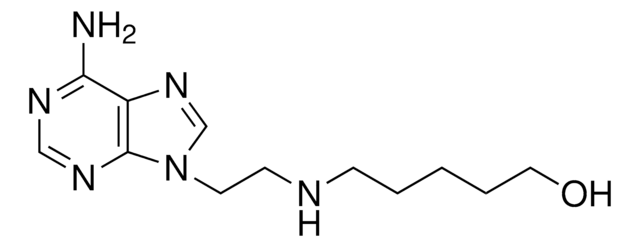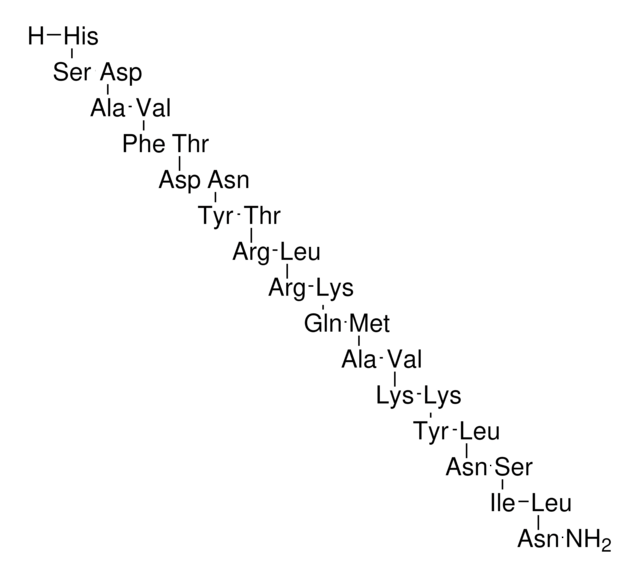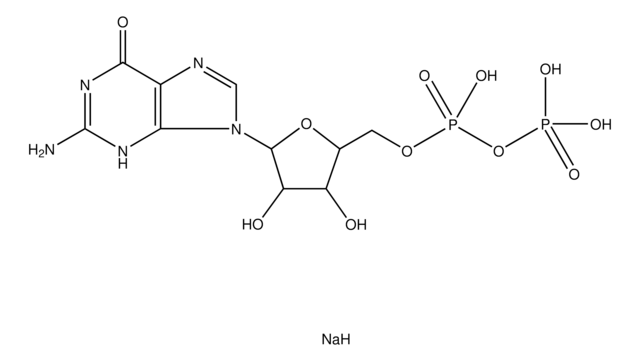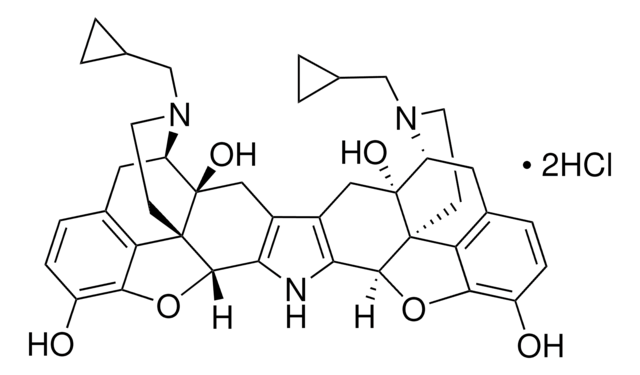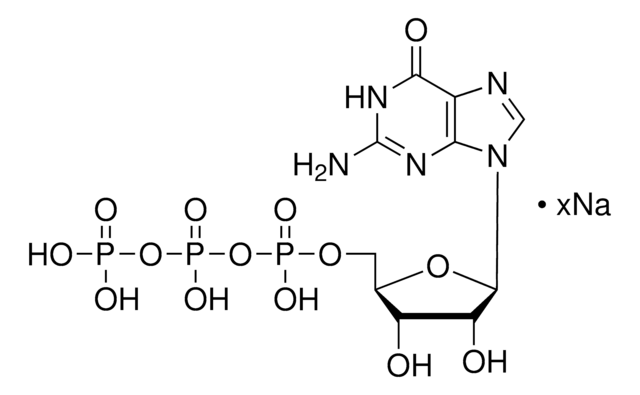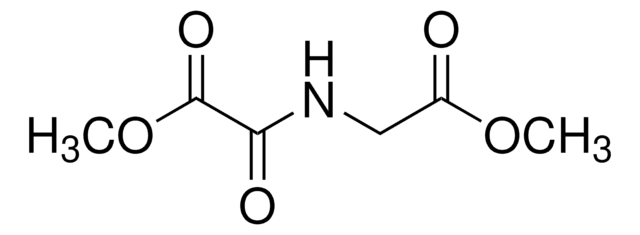A1439
Pituitary adenylate cyclase activating polypeptide-38
Sinónimos:
PACAP-38
Iniciar sesiónpara Ver la Fijación de precios por contrato y de la organización
About This Item
Fórmula empírica (notación de Hill):
C203H331N63O53S
Número de CAS:
Peso molecular:
4534.26
MDL number:
UNSPSC Code:
41106305
NACRES:
NA.32
Productos recomendados
form
powder
Quality Level
composition
Peptide content, ~70%
UniProt accession no.
storage temp.
−20°C
Gene Information
human ... ADCYAP1(116)
Amino Acid Sequence
His-Ser-Asp-Gly-Ile-Phe-Thr-Asp-Ser-Tyr-Ser-Arg-Tyr-Arg-Lys-Gln-Met-Ala-Val-Lys-Lys-Tyr-Leu-Ala-Ala-Val-Leu-Gly-Lys-Arg-Tyr-Lys-Gln-Arg-Val-Lys-Asn-Lys-NH2
General description
Pituitary adenylate cyclase activating polypeptide-38 (PACAP38) is mapped to human chromosome 18. 27-residue-amidated fragment (PACAP27) comprises another isoform. The PACAP38 is major isoform associated with mammals.
Application
Pituitary adenylate cyclase activating polypeptide-38 has been used to test its effect in stimulating the formation of cyclic AMP hypothalamus and cerebral cortex slices of chicken and to treat glioblastoma cells (U87MG) in cell migration assay to test its anti-invasive effects.
Biochem/physiol Actions
Pituitary adenylate cyclase activating polypeptide-38 (PACAP38) is a cardioprotectant and may help in treating radiation-induced heart disease (RIHD). It plays a protective role during oxidative stress in cardiomyocytes. PACAP38 has antioxidant, anti-apoptotic and anti-inflammatory property. It is implicated in the pathophysiology of migraine and cluster headache.
PACAP-38 is a neuropeptide that has substantial sequence homology to vasoactive intestinal peptide (VIP). It is reported to serve as a neuronal survival factor.
Other Notes
Lyophilized from 0.1% TFA in H2O
Storage Class
11 - Combustible Solids
wgk_germany
WGK 3
flash_point_f
Not applicable
flash_point_c
Not applicable
ppe
Eyeshields, Gloves, type N95 (US)
Certificados de análisis (COA)
Busque Certificados de análisis (COA) introduciendo el número de lote del producto. Los números de lote se encuentran en la etiqueta del producto después de las palabras «Lot» o «Batch»
¿Ya tiene este producto?
Encuentre la documentación para los productos que ha comprado recientemente en la Biblioteca de documentos.
Los clientes también vieron
J Kinhult et al.
The European respiratory journal, 15(2), 243-247 (2000-03-08)
Pituitary adenylate cyclase-activating peptide (PACAP) 38 displays several biological activities relevant to obstructive airway disease. In this study, the occurrence of PACAP 38 in human small bronchi and corresponding pulmonary arteries was analysed immunocytochemically. The dilatory effects of this peptide
T Dickinson et al.
Neuropharmacology, 38(1), 167-180 (1999-04-08)
Peripheral nerve damage often results in the development of chronic pain states, resistant to classical analgesics. Since vasoactive intestinal polypeptide (VIP) and pituitary adenylate cyclase-activating polypeptide (PACAP) are up-regulated in dorsal root ganglion cells following peripheral nerve injury, we investigated
K Tornøe et al.
American journal of physiology. Endocrinology and metabolism, 279(6), E1413-E1425 (2000-11-30)
The concentration of pituitary adenylyl cyclase-activating polypeptide [PACAP-(1-38)] in porcine adrenal glands amounted to 14 +/- 3 pmol/g tissue. PACAP immunoreactive (PACAP-IR) fibers innervated adrenal chromaffin cells (often co-localized with choline acetyltransferase). Subcapsular fibers traversed the cortex-innervating endocrine cells and
Bernadett Tuka et al.
The journal of headache and pain, 17(1), 69-69 (2016-08-01)
Activation of the trigeminal-autonomic reflex, involving the trigeminal ganglion, the superior salivatory nucleus and the sphenopalatine ganglion (SPG) is crucial in the pathophysiology of cluster headache (CH). Since pituitary adenylate cyclase-activating polypeptide-38 (PACAP-38) is present both in the SPG and
A J Martínez-Fuentes et al.
Endocrinology, 139(12), 5116-5124 (1998-12-01)
We have recently shown that the two bioactive forms of pituitary adenylate cyclase-activating polypeptide, PACAP38 and PACAP27, stimulate GH release and GH messenger RNA (mRNA) accumulation in cultured porcine pituitary cells. However, dose- and time-related differences in the response to
Nuestro equipo de científicos tiene experiencia en todas las áreas de investigación: Ciencias de la vida, Ciencia de los materiales, Síntesis química, Cromatografía, Analítica y muchas otras.
Póngase en contacto con el Servicio técnico